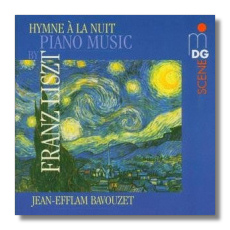
The Internet's Premier Classical Music Source
Related Links
- Liszt Reviews
- Latest Reviews
- More Reviews
-
By Composer
-
Collections
DVD & Blu-ray
Books
Concert Reviews
Articles/Interviews
Software
Audio
Search Amazon
Recommended Links
Site News
 CD Review
CD Review
Franz Liszt

Piano Music
- Invocation
- Hymne à la nuit et Hymne du matin, S. 173a
- Wiegenlied in E minor S 198
- Bagatelle ohne tonart, S. 216a "Mephisto Waltz #5"
- Trauervorspiel, S. 206 #1
- La notte, S. 699
- Nocturne "Schlaflos, Frage und Antwort", S. 203
- Grosses Konzertsolo, S. 176
- Nocturne, S. 207 "En reve"
Jean Efflam Bavouzet, piano
Dabringhaud & Grimm MDG6041350-2 75m DDD
Apart from being one of the greatest piano 'virtuosi' of all time, Liszt was also a great innovator, who was incessantly driven by a burning ardour for artistic advancement. He admired the established systems but never copied them, preferring instead to explore and refine traditional forms while creating new ones. His piano works, particularly the transcriptions, venture into unknown territory, and his turbulent spirit never allowed him to decide on a definitive or authoritative version of many of his works.
The pieces on this album are prime examples of this fact, although the programme chosen is a mixed bag of styles. Works such as the Grosses Konzertsolo and the more evocative 'Hymne du matin' and 'Hymne à la Nuit' are contrasting when compared to the composer's late style.
This recital also incorporates three other pieces inspired by three great artists for which Liszt had great admiration. 'La Notte' after Michelangelo, 'Invocation' based on one of Lamartine's poems and the 'Prelude and Isolde's Death' from Wagner's 'Tristan und Isolde' are all fitting tributes to the minds of that triptych of immortals who set Liszt's imagination alight.
The only non-Lisztian piece is Zoltán Kocsis' arrangement to Tristan's Prelude, a piece very much in tune with Liszt's language and which fits perfectly with the transcription of 'Isolde's Death'. Bavouzet has very stiff competition, but he acquaints himself well in this difficult and eclectic repertoire. An important but not indispensable addition to the Liszt discography, albeit the excellent sound and annotations.
Copyright © 2006, Gerald Fenech




















